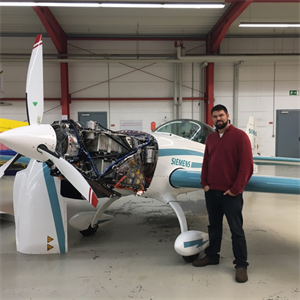 This fall, researchers from the Department of Aerospace Engineering at Texas A&M University teamed up with Siemens to develop manned aircraft completely powered by electric propulsion systems.
This fall, researchers from the Department of Aerospace Engineering at Texas A&M University teamed up with Siemens to develop manned aircraft completely powered by electric propulsion systems.
Over the past year, Dr. Darren Hartl, assistant professor of aerospace engineering and Texas A&M Engineering Experiment Station (TEES) principal investigator for this project, has worked to build a relationship with Siemens Government Technologies toward providing engineering services dedicated to this important goal.
“From the first time that I heard what Siemens was trying to do, I was very excited about the challenges and potential. I believed that our department needed to be involved in the long term,” Hartl said.
To kick off the partnership and technical progress, TEES research engineer John Rohmer has been contracted by Siemens through the aerospace engineering department, and over the next year will be embedded into the Siemens eAircraft organization, integrating and flight testing electric propulsion systems in general aviation and military aircraft. Additionally, the group will be working towards the identification of commercially-viable applications for electric propulsion and collaborate with the Federal Aviation Administration on the development of appropriate regulations for general and commercial electric aviation. Rohmer is a graduate of the Texas A&M College of Engineering, completing his bachelor’s degree in 2013 and master’s degree in 2016, both in aerospace engineering. Rohmer’s graduate research focused on novel electro-thermo-mechanical actuators for commercial aircraft applications, so he was a natural fit for this new project.
Since 2010, Siemens has been working in Europe on the electrification of manned and unmanned aircraft, with breakthroughs in aerospace grade electric motors, drives and propulsion systems. As economics and regulations continue to push the aviation industry towards electrification, eAircraft’s goal is to be the market leader in electric and hybrid propulsion, system integration, service and condition-based monitoring. Along with their partners, Siemens has committed to proving the significant benefits of electric propulsion, including increased aerodynamic efficiency by distributed propulsion, reduced noise enabling more operational hours per day, reduced fuel consumption and reduced emissions.
Siemens’ approach to electrification has drawn from some of their best technologies, utilizing product lifecycle management (PLM) software and virtual twin concepts to design record breaking motors.
“We look forward to new opportunities to work with Siemens on this emerging technology from both the research and development sides,” Hartl said. “What a great time to be an aerospace engineer.”